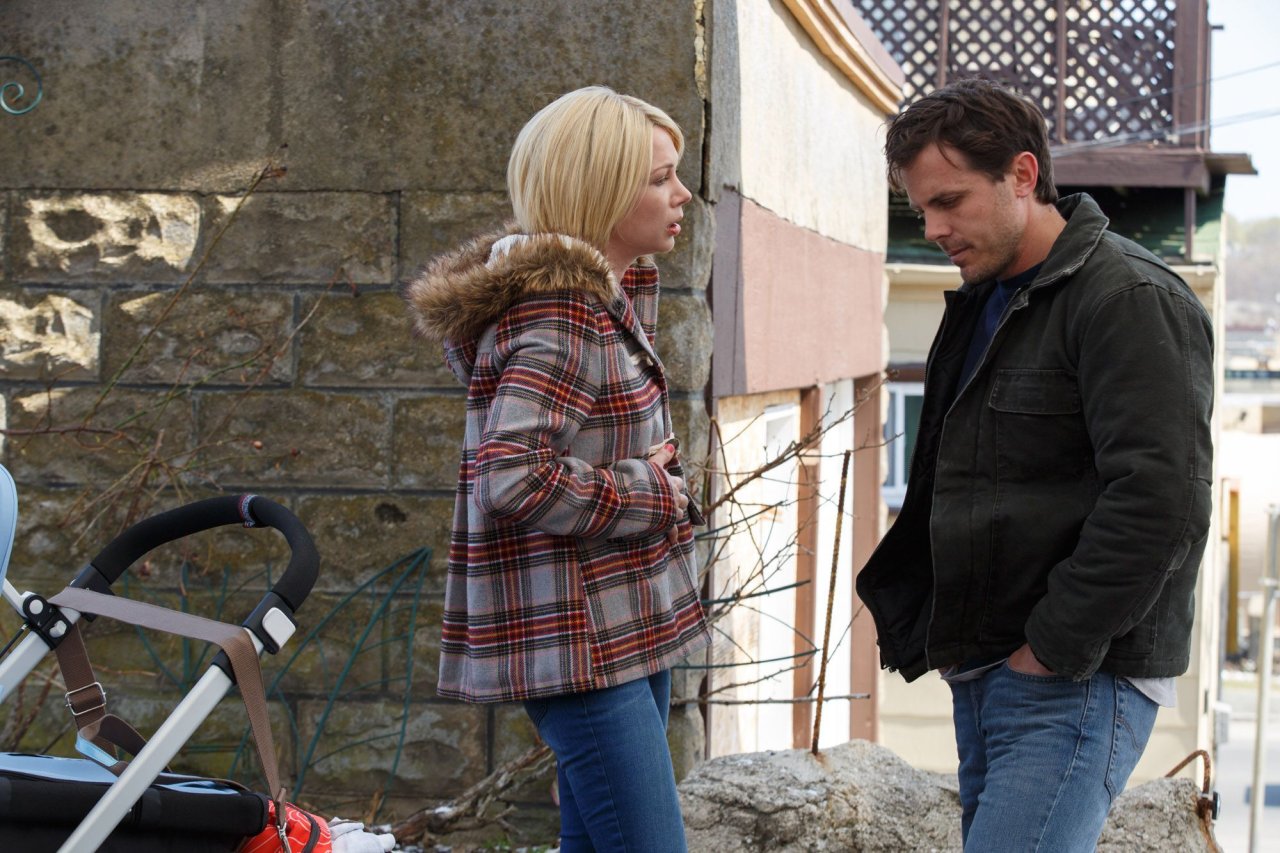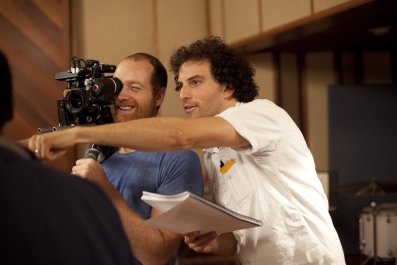Updated | The writer-director Kenneth Lonergan listens to his characters with the gentle forbearance of a Catholic priest receiving confession from his more error-prone parishioners—unshocked by what he hears, even quietly amused, generous with the absolutions. In Lonergan's third film, Manchester by the Sea, Casey Affleck plays Lee Chandler, a taciturn janitor who lives alone in a basement in Boston and spends his days scrubbing toilets, shoveling snow, doing odd handyman jobs. Hands jammed into his pockets, Lee seems a million miles away, eyes hazing over in conversations, small talk or flirtation striking him like a fly on a windscreen. You can practically feel the dead air around him. When he drinks, alone in a bar, he drinks to oblivion, and when someone looks at him the wrong way, he picks a fight almost like a kid rolling his eyes at his teacher, accepting the battering as his daily due—the tax on his existence.
What is with this guy? What happened to Lee? We don't find out until about an hour into the film, after Lee is summoned back to his hometown of Manchester, a small fishing community on Boston's north shore, by the news that his older brother Joe (Kyle Chandler) has died. Moreover, Lee has been given custody of Joe's brittle, pithy-tongued teenage son, Patrick (Lucas Hedges). Patrick's mother is an alcoholic—out of the picture. Meanwhile, there are funeral arrangements to be made, pizzas to be microwaved and two girlfriends to be shuffled. "Am I supposed to tell you to use a condom?" Lee asks Patrick; he's a wholly reluctant step-parent.
RELATED: 'Allied' dares to make spy movies sexy again
In some ways, Manchester by the Sea is a development of Lonergan's 2000 debut, You Can Count on Me , one of the most moving films of the noughties, about a brother and sister who lose their parents as kids and come together again as adults to raise the sister's young son. Makeshift parents, reluctantly recruited from within the same family, clearly intrigue Lonergan: He followed with Margaret (2011), the story of a young girl, her existence poisoned by a fatal bus accident, who must find her own way in a post-9/11 New York. Held up for years in the editing process and the subject of litigation between Lonergan and the film's producers, Margaret was, upon its release, deemed a wounded masterpiece by critics sensing a replay of the old Orson Welles story: Auteur mangled by the studio system. The film had all the spectral beauty and pathos peculiar to shipwrecks, but it was a wreck nonetheless.
In Manchester by the Sea, the ship sails beautifully from beginning to end. Flashbacks invite us to happier times for Lee, his wife, Randi (Michelle Williams), and their three kids before, finally, the plot's turning point is revealed: a lightning strike of Sophoclean intensity, playing out to the sound of Albinoni's Adagio in G Minor, that resists easy description. As does the film. It isn't a weepie, although its classical score tugs it close to such tastefully lachrymose classics as Robert Redford's Ordinary People. Nor is it one of those bittersweet indies that cunningly entwine tragedy with comedy of family dysfunction, though it is full of bickering families who drink too much.
Much of the movie simply follows as Lee keeps company with Patrick—driving him to school, band practice or one of his girlfriends' houses. A scene in a hospital turns into a family fight. Grief plays out over frozen chicken. "I can't believe we're having this conversation now," says a girlfriend of Patrick's, as news of his father's death segues into a discussion of the merits of Star Trek . Lonergan has done his writing a huge favor by forcing his story's heartbreak to peep from behind these tough, flinty New England exteriors, where it must jostle with sarcasm and world-class needling. For all its tragedy, the film sings with sharp, clear truths about human motivation and behavior. The humor deepens the heartache, and the heartache sharpens the humor.
Lonergan found the right man in Affleck, standing stony-faced while others weep, his performance a master class in submerged feeling. Every gesture carries the faint rumblings of an internal avalanche. But it's Williams who stuns, in the course of a single, astonishing dialogue toward the end of the film, after she and Lee run into each other at a supermarket. If this actress were put on earth to do one thing only, it would be this scene. "I've got nothing big to say," she says, tearing up behind agonized small talk. And then heaven's vault cracks.
Editor's note: An earlier version of this article included one sentence that was inadvertently copied from a New York Times review of the same film. The sentence has now been removed. We sincerely apologize for this oversight and have reached out to the New York Times to express our regret.
Read more from Newsweek.com:
- Quentin Tarantino opens up about retirement plans
- Ang Lee's 'Billy Lynn' can't find its targets
- 'The Edge of Seventeen' is a great teen movie























